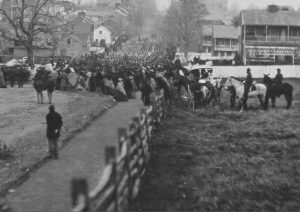
This photograph was taken by famed Civil War photographer Matthew Brady on November 19, 1863 on the occasion of the dedication of the Gettysburg military cemetery. It shows a Regiment marching down a village street in Gettyburg.
On a dreary day in November 1863, President Abraham Lincoln climbed aboard a train in Washington for a short ride to the small town of Gettysburg, Pennsylvania. It was a sad and somber occasion that brought him to the college community. Asked to speak a few words, he was part of the dedication of the new Gettysburg National Cemetery. Author Edward Everett was to be the principle speaker.
The divided nation had celebrated as General U. S. Grant ended the siege at Vicksburg on July 4th, opened the Mississippi River to Union warships, and isolated communication in Texas, Louisiana, and Arkansas with the rest of the Confederacy. In late June General Robert E. Lee moved his army of Virginia into Pennsylvania hoping to create havoc in the north. After three days in early July of hand-to-hand combat in hot, sultry weather, the death toll was horrendous. It was estimated at 7,000 men dead.
When Lee pulled his survivors back to Virginia Union newspapers heralded General George Gordon Meade victor. However, Meade and his army were nearly ravished in the worst three-day battle in the Civil War. They slowly made their way north. Both armies left their dead for the small population of Gettysburg to bury.
By September Union supporters were busy constructing a planned cemetery on the idea of a rural park where Union soldiers were buried with their unit and state. More than 3500 men, known and unknown, lie in that stately park. At the dedication, about 15,000 people heard Edward Everett talk for three hours.
But no Confederate graves are to be found. While some Confederates may still lie in shallow graves today, the vast majority was re-interred at cemeteries in Virginia and other southern sites. You may question the reality of this policy. But remember this was a rebellion by part of the United States. By joining the Confederate Army, those men chose or were drafted into an enemy army. We were a nation divided that took many, many years to completely reunite.
At the end of the ceremony, Everett reportedly told President Lincoln, “I should be glad, if I could flatter myself that I came as near to the central idea of the occasion, in two hours, as you did in two minutes.”
Why did I choose to write about this event today? Well, for one reason the Gettysburg Address was delivered on November 17, 1863. But more importantly, I believe we should all heed the last sentence in Lincoln’s speech, “that this nation under God shall have a new birth of freedom, and that government of the people, by the people, for the people shall not perish from the earth.” Remember this as you enjoy Thanksgiving.
